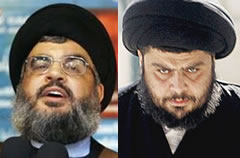 Iraqis loyal to Muqtada al-Sadr, the well-known anti-American Shiite cleric, are fighting in Syria in support of the Assad regime, according to the opposition.
Iraqis loyal to Muqtada al-Sadr, the well-known anti-American Shiite cleric, are fighting in Syria in support of the Assad regime, according to the opposition.
Maj. Maher al-Naimi, a spokesman for the rebel Free Syrian Army, told the Arabic newspaper, Asharq Al-Awsat: “There are armed groups coming to Syria to support the regime’s army. This was confirmed to us by Syrian citizens, whose homes were stormed, and they could identify them from their non-Syrian accents.”
“However, up until now, we have been unable to capture any of them, because the regime’s army is trying as much as possible to hide their bodies as quickly as possible, whilst leaving the wounded bodies and corpses of Syrians lying on the ground for many hours”.
Al-Sadr has expressed support for the Assad regime and last week his office released a statement where the cleric said there is “a big difference” between what the protests in Syria and the “great revolutions in Tunisia, Egypt, Libya, Bahrain and Yemen.”
“One of the reasons behind this difference is that Bashar al-Assad is against the American and Israeli presence and his attitudes are clear, not like those who collapsed before him, or will collapse,” added the statement .
Meanwhile, with the self-proclaimed leader of the FSA announcing the establishment of a transitional military council, the anti-Assad movement could face a dangerous split.
Ryad al-Asaad, who announced his defection from the Syrian army in July, has anounced the formation of a “Transitional Military Council” dedicated to ousting the regime.
After leaving the army al-Asaad fled to Turkey but has since returned to Syria. The headquarters of the FSA, however, are located in Turkey.
The council features nine officers, including four colonels and three lieutenant-colonels.
The council says its aims are to “bring down the current regime, protect Syrian civilians from its oppression, protect private and public property, and prevent chaos and acts of revenge when it falls.”
The opposition group also stated its will to establish a military tribunal of the revolution which would hold Assad regime officials accountable for those found guilty of murder and acts of aggression against citizens.
The statement also promised the powers of the council would expire upon the election of a democratic government.
Since the return of al-Asaad the FSA’s attacks on government forces have intensified and the group has gained more popular support.
Last week, Col. Ammar al-Wawi, the commander of the FSA’s Ababeel battalion, said the latest offensives include an attack on the air force base in the Damascus suburb of Harasta.
He also said FSA fighters from his Aleppo province-based battalion recently attacked Aleppo’s air force intelligence complex, located on the outskirts of city.
“We were able to target one of the eight Battlefield Range Ballistic Missiles present there,” he added.
Al-Naimi said: “FSA operations are still in the stage of defence. Conditions will remain as such between the regime’s army and the FSA until the establishment of a buffer zone and a no-fly area. This is in addition to the fact that we so far do not have any weapons except those smuggled in by army dissidents, or ones which we are able to buy, which cannot fire further than 400 metres”.
“With regards to offensive operations targeting the security command headquarters and security branches, this is the only way to respond to the regime’s army storming our cities and attacking our citizens with its tanks and weaponry. This is what it has resorted to in recent times, and thus it has become a legitimate target for us,” he added.
As the FSA fights the regime on the ground, the Syrian National Council, another opposition group, continues its diplomatic offensive.The group says it wants to be recognised as the legitimate representative of the Syrian people.
On its Web site, the group states its general principle which include a “new Syria is a democratic, pluralistic, and civil state; a parliamentary republic with sovereignty of the people based on the principles of equal citizenship with separation of powers, smooth transfer of power, the rule of law, and the protection and guarantee of the rights of minorities. ”
Among other main objectives it also states its intention to work to restore Syria’s “sovereignty in the occupied Golan Heights on the basis of relevant and legitimate international laws and resolutions.”
Israel conquered the Golan in the 1967 war and later unilaterally annexed the territory.
The group also says it will “support the full and legitimate rights of the Palestinian people.”
IB Times
Leave a Reply
You must be logged in to post a comment.